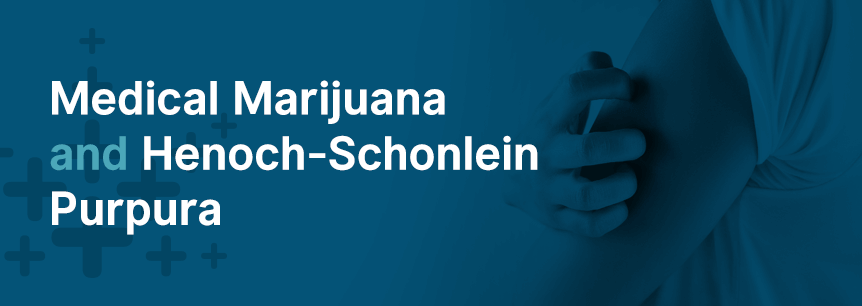
When you’re experiencing Henoch-Schonlein purpura (HSP), you’re dealing with inflammation, joint pain, and possibly even seizures. On top of that, many individuals also struggle with depression and anxiety since this condition can often affect their quality of life. Medical marijuana for Henoch-Schonlein purpura treatment can help with these and many of the other debilitating symptoms of HSP.
The disease Henoch-Schonlein purpura causes your body’s small blood vessels to become inflamed and leak. The main symptom of this disease is a rash that appears like lots of small raised bruises. Henoch-schonlein purpura can also affect your joints, kidneys and digestive tract.
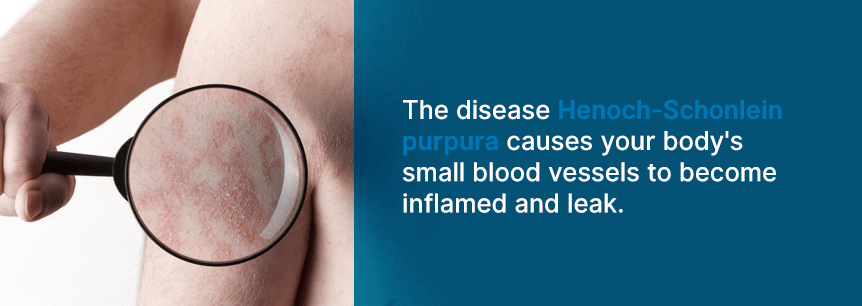
It can develop at any point in your life, but tends to affect children between 2 and 6 years old, according to the National Institute of Diabetes and Digestive and Kidney Diseases (NIDDK). It’s the most common type of childhood vasculitis, or inflammation of the blood vessels, and causes small blood vessel inflammatory changes.
Most individuals completely recover from HSP, but some people develop long-term kidney damage. The condition generally goes away after four to six weeks. In some cases, individuals experience a symptom recurrence over this time, but they don’t experience any long-term consequences.
If the disease affects your organs, like your intestines and kidneys, you’ll likely require treatment and frequent follow-up visits to your doctor to prevent severe complications. HSP can cause chronic kidney disease and kidney failure in adults. A diagnosis of end-stage renal disease means you need a kidney transplant or dialysis to filter your blood.
The most obvious symptom of HSP is a rash. Blood vessels in the skin leak, causing a rash that looks like small bruises or dots on your arms, legs, and buttocks. It often starts off looking like hives and then changes to look more like bruises, spreading to the back, chest, and face. When pressed, the rash doesn’t turn pale or disappear.
Other Henoch-Schonlein purpura symptoms include:
While all individuals with HSP develop a rash, in around one-third of all cases, pain in the abdomen or joints comes before the rash by as much as two weeks, reports NIDDK.
Certain factors could increase your risk of HSP, including:
HSP develops when your body’s immune system attacks its organs and cells. Attacking your own organs is an abnormal immune system response. Generally, your immune system makes proteins or antibodies to protect your body from viruses, bacteria, and other foreign substances.
These antibodies also attack your blood vessels in HSP. The factors causing this response from the immune system aren’t known. But, around 30 to 50 percent of HSP cases, individuals have a cold or another upper respiratory tract infection before they develop HSP. This disease also correlates with:
Henoch-schonlein purpura goes by many other names including:
For most individuals, symptoms don’t leave any long-term problems and usually improve within a month. However, recurrences are common.
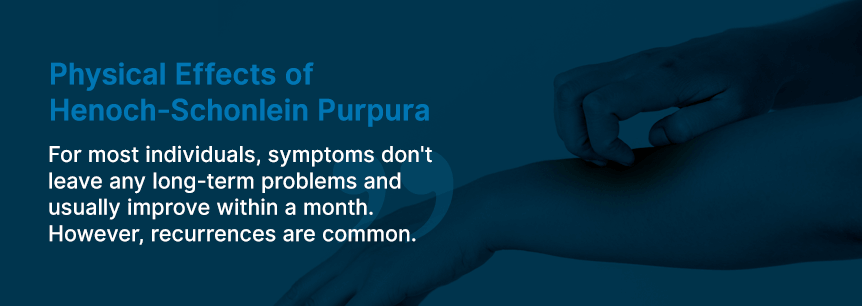
Complications linked with HSP include:
According to the Vasculitis Foundations, rheumatic diseases can be physically devastating. These types of diseases often cause disability and pain, causing individuals with rheumatic disease to make dramatic changes in lifestyle.
Easy tasks like opening a medication bottle or tying shoes become very challenging, but rheumatic diseases can have effects that go beyond just physical. They can limit a person’s activities that were once a part of their daily routine. People have to give up hobbies and habits that used to relieve stress and bring happiness. An individual’s career that offered them a sense of identity and purpose might change.
Having to suddenly manage a chronic disease and struggle with new restrictions or limitations impacts every area of the individual’s life, making them feel overwhelmed.
Although most rheumatic disease patients can handle the emotional strain a chronic disease brings on, some patients could develop anxiety or depression — common co-existing conditions with rheumatic diseases.
The Vasculitis Foundation provides these estimates about Henoch-Schonlein Purpura:
A London physician, Dr. William Heberden, described the first HSP cases in 1801. He wrote about a 5-year-old boy who experienced swelling and pain in different areas of his body. In some cases, he experienced belly pain with vomiting and blood-tinged urine. The skin of his leg was full of purpura, or bloody points.
The boy struggled with all four hallmarks of the disease:
Edouard Henoch and Johann Schonlein reported other cases decades after Heberden. They realized the disease often came after an upper respiratory infection and wasn’t always self-limited, in some cases progressing to severe kidney involvement. The disease is named after them.
HSP often resolves itself within a month and doesn’t cause any long-term effects. Plenty of fluids, bed rest and OTC pain relievers can help.
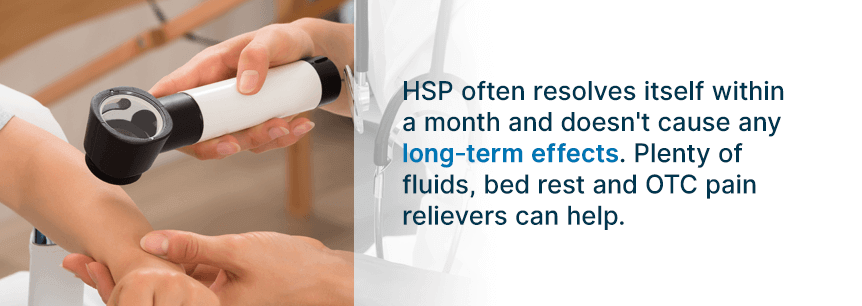
Treatment’s main goal is to relieve your symptoms of swelling, joint pain, and abdominal pain. Those who have kidney involvement might receive treatment with the goal of preventing long-term kidney disease.
The rash rarely requires treatment. Doctors often treat joint pain with nonsteroidal anti-inflammatory medications like ibuprofen or aspirin. Side effects of these medications may include:
Doctors may prescribe corticosteroids like prednisone to prevent or treat HSP complications, but this is controversial. They usually prescribe them to treat serious gastrointestinal symptoms. Side effects of corticosteroids may include:
Because of these side effects, doctors usually prescribe corticosteroids as a short-term treatment.
If you part of your bowel has ruptured or folded in upon itself, you may require surgery to repair it.
Researchers are comparing three various standards of care options for treatments in a randomized trial for individuals with isolated skin vasculitis.
Also, researchers are conducting a multi-center observational study for evaluating the transcriptome and histopathology of cutaneous lesions in individuals with various vasculitis types.
Researchers are currently working on nearly two dozen clinical trials on Henoch-Schonlein Purpura.
Medical marijuana for Henoch-Achonlein purpura treats the symptoms of this disease and not the disease itself. You can take cannabis to relieve the symptoms without experiencing all the harsh side effects of traditional medications. Patients can rub a marijuana extract salve on their painful joints or take the extract orally under their tongue to help relieve abdominal pain and gastrointestinal issues.
Cannabis has anti-emetic properties that help stop vomiting and is extremely effective at helping with insomnia. Marijuana is also an effective anti-inflammatory.
For hundreds of years, individuals have been using marijuana to treat their depression. It heightens your mood and provides energy.
HSP sufferers often experience chronic pain so debilitating that they turn to strong opioids to experience some relief. These medications, however, are very addictive. Marijuana helps treat chronic pain effectively and is much safer than opioid drugs. Whether they used an oral spray, ate the herb or smoked cannabis, patients found a strong improvement in their pain.
Medical marijuana for HSP can help treat symptoms such as:
Medical weed effectively reduces chronic inflammation and inflammatory-related pain due to its THC and CBD — the plant’s main cannabinoids.
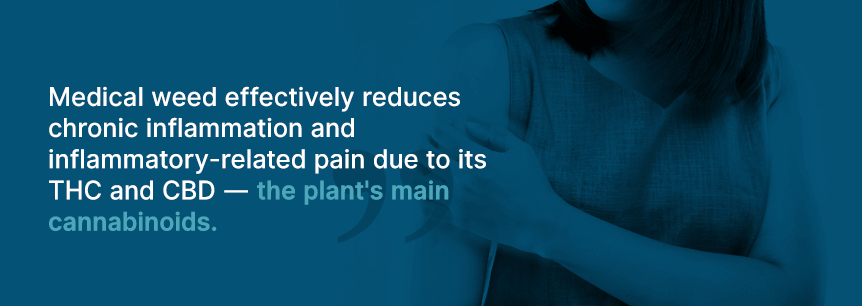
Both THC and CBD have been helping many patients reduce their inflammation caused by a variety of conditions. But, it’s the beta-caryophyllene, also found in cannabis, that impacts your CB2 receptor. One study reported by Science Daily showed beta-caryophyllene reduced inflammation in mice with swollen paws by 70 percent.
Medical pot also helps treat seizures with studies showing its effectiveness as an epilepsy treatment.
These marijuana strains can help treat your HSP-related symptoms as outlined above. They’re effective because just one strain can treat most — if not all — the symptoms you’re experiencing. Some potentially helpful strains to tackle your HSP symptoms include:
Along with the strains, consider the different delivery methods. There are a variety of ways to consume cannabis. Each method offers its benefits, and none delivers the same dosage in the same manner. By experimenting with different methods, you can find the one that will provide you with the most benefit.
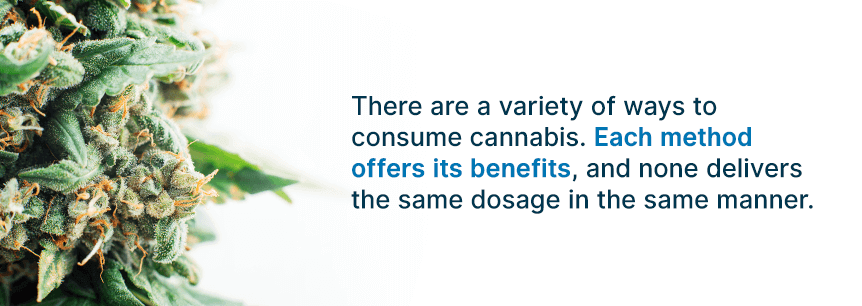
Some methods of cannabis delivery include:
Smoking marijuana delivers quick relief, but can lead to respiratory issues, dry mouth and red eyes. Edibles take longer to affect you, but the effects also last longer.
CBD oil, like other weed products, is gaining popularity as the stigma surrounding the herb declines. Growers extract CBD to make the oil, leaving out the psychoactive THC.
Because CBD may be helpful for HSP because it can reduce the following symptoms:
Learning your state laws regarding medical cannabis is your first important step. Here at MarijuanaDoctors.com, you can obtain information about how medical cannabis will help you, where to get your medicine, how much you should take and information about dispensaries and their cannabis products.
To get started, find a cannabis doctor to provide you with a recommendation to start your marijuana treatment for Henoch-Schonlein purpura. You can then browse our dispensary directory to find your desired marijuana products for your HSP symptoms.
Find A Doctor Find A Dispensary


Please allow us to access your location to find local dispensaries.
VIEW ALL DISPENSARIES ➔